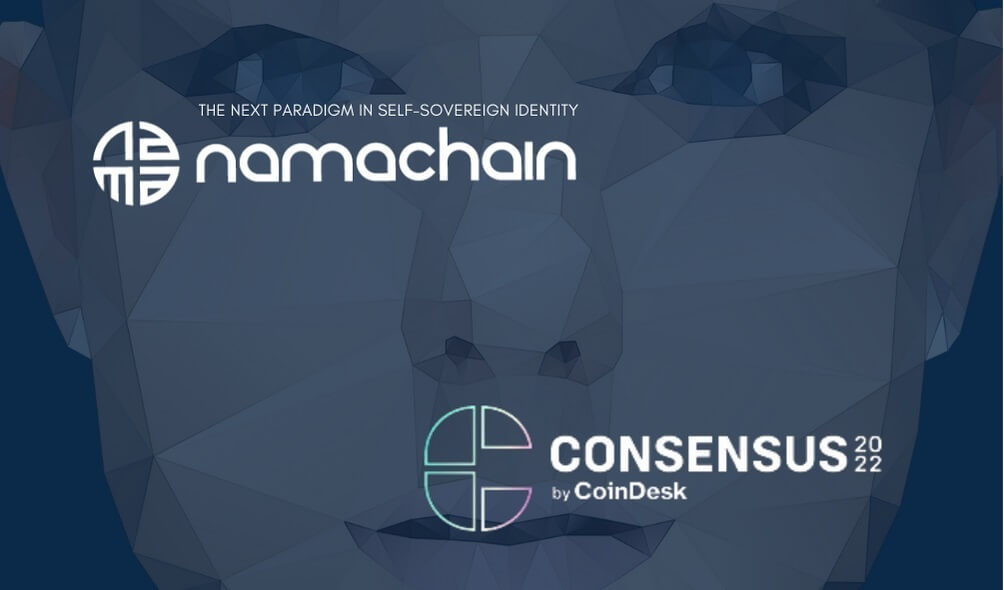NamaChain at Consensus 2022
Video Transcript
The Hidden Order– I’m here with these amazing guys right here and I’m happy to do introduce them to you.
Jonathan– I’m Jonathan Goode, I’m the CTO of NamaChain
Dinesh– I’m Dinesh, I’m the Chief Architect of NamaChain
The Hidden Order– So tell us what you guys are building
Jonathan– So we’re building an identity platform based on key management principles to allow the user to not have to manage their keys, the keys don’t have to be stored anywhere and they can re-establish and regenerate their keys with authentication that they’re familiar with.
So we are trying to create a seamless onboarding experience for us, for platforms that want to be able to leverage it and you know create single sign-on experience so the user can use their keys and adopt into any platform, any blockchain network whatever happens to be.
Dinesh– I’m the chief architect so I designed this system and worked closely with Jonathan to create the key management and integrating other system to work with us.
Jonathan– When you’re talking about blockchain I have a private key and that’s what I’m concerned about that’s what drives all the functionality that I can achieve the ownership everything that’s called the PKI (Public Key Infrastructure) and this is what the technology that drives blockchain and so when I’m talking about key management I’m thinking about okay well what do I do with the key, Where do I put it where do I store it and most solutions right the current solution that is considered the standard is you know wallets right, Now wallet keeps my keys and you know there’s three kinds of wallets right now there’s a custodial wallet, kind of like semi-custodial wallet, and the non-custodial wallets that we are more used to like Metamask and such. So when I have a custodial wallet it means that the service I’m dealing with has full control over my keys and these are typically exchanges the big exchanges like Binance and stuff like that, that’s how they operate and that’s how they do that so they can adhere to regulators, and there’s the semi kind of custodial wallets which I have control over but still has to run on the server right and they’re gonna authenticate me and I’m gonna tell it what to do but I have to still trust that they’re gonna do it because they still have the key and then there’s the non-custodial wallets that you know we’re all used to we’re more familiar with the 12 word passphrase and it allows me to have my key only just for me so I have full control right.
So what we do is We do none of that, the key isn’t stored anywhere, I can regenerate that key by authenticating successfully and I can establish many different ways of authenticating and adding on to that authentication for extra security to be able to regenerate that key anywhere I want to generate it on a browser, on a mobile device and on a laptop it doesn’t matter.
The Hidden Order– You could probably use your fingerprint right to to find your keys or let’s say you lose your keys so that’s super cool tell us how that would work.
Jonathan– So we can’t get too far into the specifics of of how it works but the idea is you know I have my account right that I create I have a username I have a password and when I want to you know establish myself on a device without authenticating to the cloud maybe I just want to do something on my device then I could establish my same you know metadata to be able to use my thumbprint to generate that key now that key is not stored, it’s not stored anywhere in the cloud, it’s not stored on my device and the only way it comes into play is when I authenticate successfully and just for the duration that I need it then that’s destroyed.
The Hidden Order– Wow that’s super cool I’m super excited about your project, So I reached out to them because they were super cool on the floor at consensus and I just trying to see what they’re trying to build and then, I would like to see is there anything you want to add to that
Dinesh– Yeah so in the basic now we only have a username and password mechanism to log in so most of the people used to that methodology already so for them to onboarding is easy, another thing is we generate keys during runtime just like Jonathan said that I mean user could reset the password anytime they want it won’t affect the actual private key .
Jonathan– One thing to achieve with uh kind actually all the networks is to establish our smart contracts on those networks so that these all these can benefit from this key management and all the platforms and we can build the bridge between Web2 and Web3 so that I can use my existing Web3 accounts and on whatever network it happens to be to authenticate and use Web3 in a Web2 way.
The Hidden Order– So I absolutely love that idea and that infrastructure you guys are building so where can we find you guys
Jonathan– https://namachain.com
The Hidden Order– What are your social handles.
Dinesh– Yeah we are on Twitter, Linkedin and Telegram.
The Hidden Order– Yeah awesome pleasure meeting you guys appreciate you guys doing this and hopefully we’ll see you guys at consensus again.
Related Articles
PKI Is Outdated: How to Upgrade To A More Powerful Key Management Solution Developed For Web2 and Web3
With the fall of FTX and other exchanges including Celcius and BlockFi, people are losing trust in centralized exchanges and more of the crypto investors are moving to decentralized platforms. Decentralized exchanges are non-custodial, and users have total control of their private keys and their funds, unlike CEX which holds and manage users’ keys on their behalf. But although DEXs promise more transparency and accountability, they cannot compete with their counterparts in terms of UX, flexibility, liquidity, service, and speed. In spite of the numerous challenges, decentralized crypto exchanges have the potential to go mainstream once they become more user-friendly, flexible, and liquid. Then they can kill the CEX for good.
CEX Killer? Now That Trust In Centralized Exchanges Has Eroded, Will Decentralized Crypto Exchanges (DEXs) Go Mainstream?
With the fall of FTX and other exchanges including Celcius and BlockFi, people are losing trust in centralized exchanges and more of the crypto investors are moving to decentralized platforms. Decentralized exchanges are non-custodial, and users have total control of their private keys and their funds, unlike CEX which holds and manage users’ keys on their behalf. But although DEXs promise more transparency and accountability, they cannot compete with their counterparts in terms of UX, flexibility, liquidity, service, and speed. In spite of the numerous challenges, decentralized crypto exchanges have the potential to go mainstream once they become more user-friendly, flexible, and liquid. Then they can kill the CEX for good.
How is Blockchain redefining technology for the enterprise world?
Blockchain has the potential to disrupt almost every industry, redefining our relationship and reliance on technology through decentralization, improved security and better compliance.



